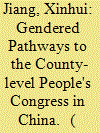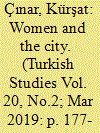| Srl | Item |
| 1 |
ID:
184719


|
|
|
|
|
| Summary/Abstract |
Women are underrepresented in legislature almost worldwide, and China is no exception. Although the Chinese Communist Party (CCP) implemented its first gender quota in 1933, gender quotas and women's representation in China remain understudied. This study fills the literature gap by examining the subnational variation in gender quota implementation and women's representation in the county-level people's congresses (CPC). Through a comparison of four county-level units in Hunan and Hubei with similar socioeconomic features yet contrasting results in the numbers of female representatives elected in the 2016 CPC election, this study argues that women's access to CPCs is affected by the CCP's adoption and enforcement of grassroots quotas. The fieldwork shows that although all cases introduced a 30 per cent gender quota, only CPCs in Hunan province were able to meet the quota requirements. This was because the grassroots quota threshold was raised in Hunan and strictly enforced, partly as a response to the 2013 Hengyang vote-buying scandal. In contrast, CPCs in Hubei province nominated a large number of “first hands” (yibashou) candidates, very few of whom were women.
|
|
|
|
|
|
|
|
|
|
|
|
|
|
|
|
| 2 |
ID:
169037


|
|
|
|
|
| Summary/Abstract |
It is vital to understand the structural and institutional dynamics behind female empowerment as its realization benefits not only women but also society at large. Drawing on an original, global-level dataset that covers 169 countries between 1960–2014, this article mainly explores the effect of urbanization on women’s empowerment throughout the world. The article argues that urbanization has distinctive effects in different realms of female empowerment in politics, economics, and education, with the biggest impact being in education. The article further states that urbanization has a non-linear effect on women’s empowerment with a diminishing impact at higher levels of urbanization. After certain levels of urbanization, other political and economic factors, such as how democratic and economically affluent a country is, will determine the discrepancies of female empowerment in countries with similar levels of urbanization. To further test the stated hypotheses, the article looks at the Turkish case as a typical example of a patriarchal society with a neoliberal economic order. In light of the global and local level analyses, the paper aims to contribute to extant debates and studies in feminist studies, urban studies, modernization theory, and democratization.
|
|
|
|
|
|
|
|
|
|
|
|
|
|
|
|